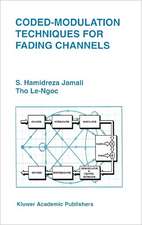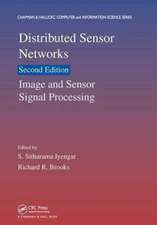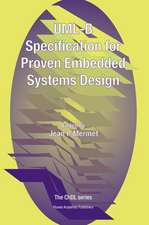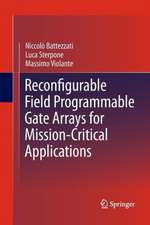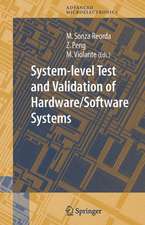Software-Implemented Hardware Fault Tolerance
Autor Olga Goloubeva, Maurizio Rebaudengo, Matteo Sonza Reorda, Massimo Violanteen Limba Engleză Hardback – 19 iun 2006
The first SIHFT techniques were proposed and adopted several decades ago, but they have been the object of new interest in the past few years, mainly due to the need for developing low-cost safety-critical computer-based applications in fields such as automotive, biomedics, and telecommunications. Therefore, several new approaches to detect, and when possible correct, transient and permanent faults in the hardware have been recently proposed. These approaches are innovative (with respect to those proposed in the past) since they are of higher applicability (often starting from the source-level code of an application) and generality, being capable of coping with many different fault types. The book presents the theory behind software-implemented hardware fault tolerance, as well as the practical aspects related to put it at work on real examples. By evaluating accurately the advantages and disadvantages of the already available approaches, the book provides a guide to developers willing to adopt software-implemented hardware fault tolerance in their applications. Moreover, the book identifies open issues for researchers willing to improve the already available techniques.
| Toate formatele și edițiile | Preț | Express |
|---|---|---|
| Paperback (1) | 941.82 lei 6-8 săpt. | |
| Springer Us – 29 oct 2010 | 941.82 lei 6-8 săpt. | |
| Hardback (1) | 950.03 lei 6-8 săpt. | |
| Springer Us – 19 iun 2006 | 950.03 lei 6-8 săpt. |
Preț: 950.03 lei
Preț vechi: 1158.57 lei
-18% Nou
Puncte Express: 1425
Preț estimativ în valută:
181.81€ • 189.11$ • 150.10£
181.81€ • 189.11$ • 150.10£
Carte tipărită la comandă
Livrare economică 14-28 aprilie
Preluare comenzi: 021 569.72.76
Specificații
ISBN-13: 9780387260600
ISBN-10: 0387260609
Pagini: 224
Ilustrații: XIV, 228 p.
Dimensiuni: 155 x 235 x 18 mm
Greutate: 0.58 kg
Ediția:2006
Editura: Springer Us
Colecția Springer
Locul publicării:New York, NY, United States
ISBN-10: 0387260609
Pagini: 224
Ilustrații: XIV, 228 p.
Dimensiuni: 155 x 235 x 18 mm
Greutate: 0.58 kg
Ediția:2006
Editura: Springer Us
Colecția Springer
Locul publicării:New York, NY, United States
Public țintă
ResearchCuprins
Background.- Hardening the Data.- Hardening the Control Flow.- Achieving Fault Tolerance.- Hybrid Techniques.- Fault Injection Techniques.
Textul de pe ultima copertă
Software-Implemented Hardware Fault Tolerance addresses the innovative topic of software-implemented hardware fault tolerance (SIHFT), i.e., how to deal with faults affecting the hardware by only (or mainly) acting on the software.
The first SIHFT techniques were proposed and adopted several decades ago, but they have been the object of new interest in the past few years, mainly due to the need for developing low-cost safety-critical computer-based applications in fields such as automotive, biomedics, and telecommunications. Therefore, several new approaches to detect and, when possible, correct transient and permanent faults in the hardware have been recently proposed. These approaches are innovative (with respect to those proposed in the past) since they are of higher applicability (often starting from the source-level code of an application) and generality, being capable of coping with many different fault types. The book presents the theory behind software-implemented hardware fault tolerance, as well as the practical aspects related to put it at work on real examples. By evaluating accurately the advantages and disadvantages of the already available approaches, the book provides a guide to developers willing to adopt software-implemented hardware fault tolerance in their applications. Moreover, the book identifies open issues for researchers willing to improve the already available techniques.
The first SIHFT techniques were proposed and adopted several decades ago, but they have been the object of new interest in the past few years, mainly due to the need for developing low-cost safety-critical computer-based applications in fields such as automotive, biomedics, and telecommunications. Therefore, several new approaches to detect and, when possible, correct transient and permanent faults in the hardware have been recently proposed. These approaches are innovative (with respect to those proposed in the past) since they are of higher applicability (often starting from the source-level code of an application) and generality, being capable of coping with many different fault types. The book presents the theory behind software-implemented hardware fault tolerance, as well as the practical aspects related to put it at work on real examples. By evaluating accurately the advantages and disadvantages of the already available approaches, the book provides a guide to developers willing to adopt software-implemented hardware fault tolerance in their applications. Moreover, the book identifies open issues for researchers willing to improve the already available techniques.
Caracteristici
No other comprehensive reference on software-implemented hardware fault tolerance is now available Serves as a developers guide Highlights unsolved issues in SIHFT Includes supplementary material: sn.pub/extras






